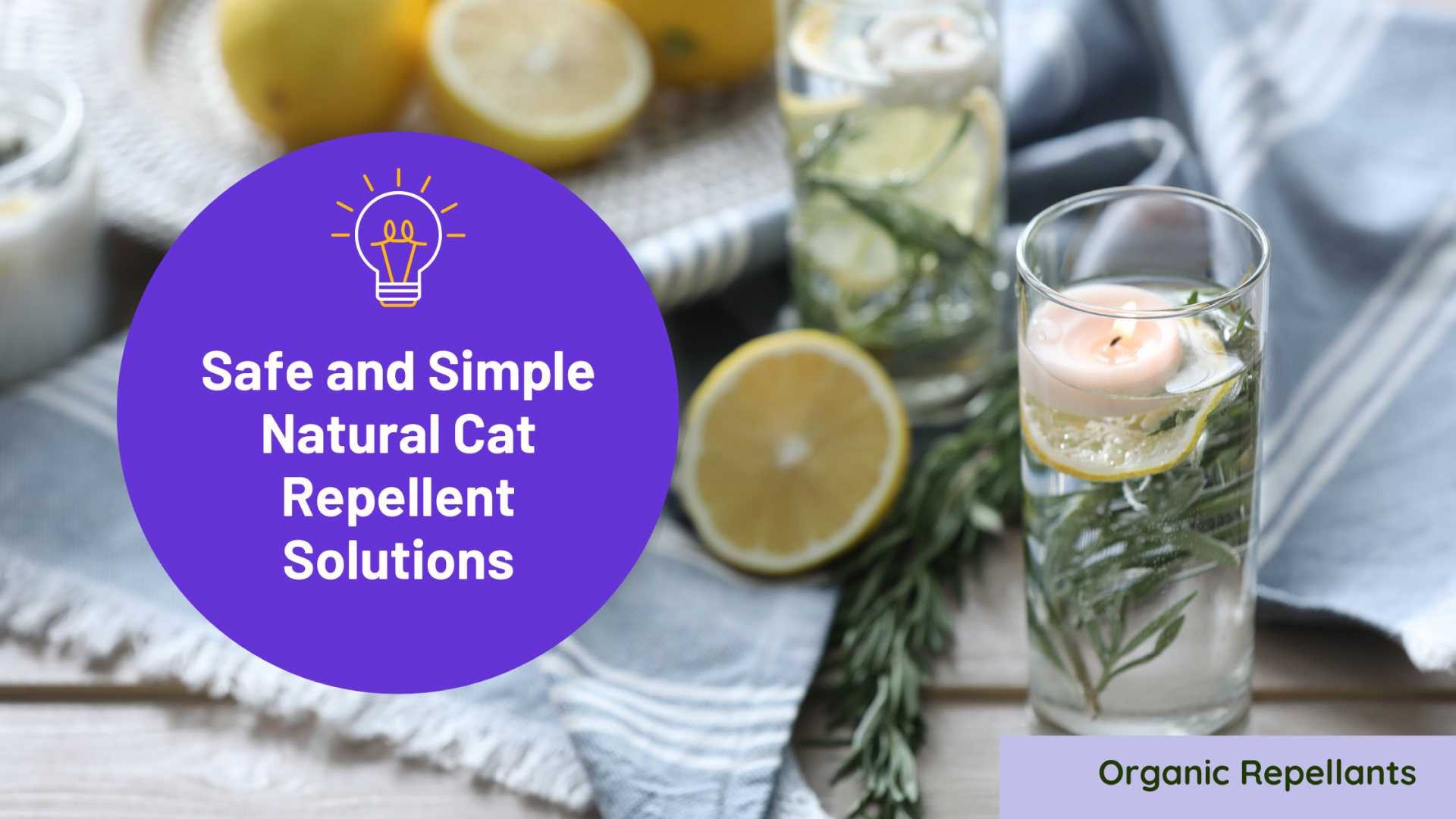Whether you’re trying to protect your plants or want to keep your cats away from certain parts of your home, there’s a variety of natural cat-repellent solutions you can try.
In this blog, we focus on solutions that are easy to implement and environmentally friendly. We aim to provide you with practical tips and insights that you can use immediately, without resorting to harmful chemicals or drastic measures.
What Is a Natural Cat Repellent?
A natural cat repellent is a solution that’s used to deter cats from entering or staying in specific areas without causing them harm.
Unlike chemical repellents that may contain harmful ingredients, natural repellents use safe, non-toxic ingredients or approaches that leverage a cat’s natural aversions.
Most natural cat repellents rely on smells, textures, water, and motion to deter cats. For example, some of the smells that cats don’t love include:
- Citrus
- Lavender
- Peppermint
- Eucalyptus
They’re also usually not big fans of water, sticky surfaces, and mulch or small pebbles. These are all elements that you can use to create a natural cat repellent, but more on that later.
Why Use a Natural Cat Repellent?
There are several reasons why you may want to consider using a natural cat repellent in and around your home and property:
1. Safety for Pets and Humans
Natural repellents are typically free from harmful chemicals, making them safer for both cats and humans. This is especially important in households with children or other pets who might come into contact with the repellent.
2. Environmental Concerns
Many chemical repellents can have negative impacts on the environment, including harming plants and contaminating soil or water sources. Natural repellents are usually eco-friendly and biodegradable, posing less risk to the ecosystem.
3. Humane Treatment of Cats
Pet owners who are concerned about the well-being of their cats and the cats in their neighborhood prefer using natural repellents because they deter cats without causing them harm or distress. Natural repellents work by exploiting a cat’s natural aversions rather than using harmful or painful methods.
4. Allergy Prevention
People with allergies to cats can use natural repellents to keep cats away from their living spaces without resorting to drastic measures. This helps to minimize allergic reactions while maintaining a humane approach.
5. Garden Protection
Gardeners often use natural repellents to protect their plants from being dug up or used as litter boxes by neighborhood cats. Natural solutions can effectively keep cats away without damaging plants or soil health.
6. Indoor Area Preservation
Inside the home, natural repellents can be used to keep cats off furniture, countertops, and other areas where they are not welcome. This helps to prevent damage to your belongings and maintain cleanliness without exposing household members to toxic chemicals.
7. Cost-Effectiveness
Many natural repellents can be made at home using common household ingredients, making them a cost-effective alternative to store-bought chemical repellents. This can be particularly appealing if you’re on a budget.
How to Make a Natural Cat Repellent at Home
There are a few different ways that you can keep your cats (or those in your neighborhood) out of your garden and away from certain areas in your home.
Get Strategic About Your Garden Beds
If keeping cats away from certain beds and plants is your main priority, here are a few things you can try:
- Collect citrus peels. Cats don’t love the smell of citrus, so consider tossing lemon, orange, and grapefruit peels around your raised beds and plantings. The cat’s nose will do the rest.
- Pick the right herbs. For your most important beds, look at planting strong-smelling herbs such as lavender, rosemary, thyme, and mint – cats are repelled by these smells.
- Grab some pine cones. Cats will be more reluctant to do their business in beds that have unpleasant surfaces, so consider adding a few pine cones to your most prized beds.
Use Essential Oils In Your Home
For the areas of your home that you would prefer to keep cats out of, consider using essential oil sachets or diffusers – lavender, citrus, and eucalyptus scents are best.
You can also dilute essential oils in a spray bottle and spritz furniture or areas of your home that you want to keep kitties away from.
Water and Motion Work Too
Cats generally dislike water and sudden movements, so motion-activated sprinklers or ultrasonic devices can be effective deterrents in your garden and within your home.
- Motion-Activated Sprinklers: These devices spray water when they detect movement, scaring cats away without harm.
- Ultrasonic Repellents: These devices emit a high-pitched sound that is unpleasant to cats but generally inaudible to humans.
Make a Homemade Solution
There are also several homemade sprays that you can make using ingredients you probably already have in your home. The only additional item you may need is a spray bottle.
- Vinegar and Water Spray: Mix equal parts vinegar and water in a spray bottle and apply it to areas where cats are unwanted.
- Citronella and Water Spray: Add about three-quarters of a cup of water to a spray bottle before mixing in around 20 drops of citronella oil. Keep in mind that this will be quite a strong spray, so you may want to use it sparingly.
- Garlic, Pepper, and Lemon Spray: Another solution that you can add to a spray bottle is a teaspoon of pepper, dry mustard, and cinnamon, as well as one clove of crushed garlic. Lastly, add a few drops of lemon essential oil to give it a more pleasant smell for the people living in your home.
Final Thoughts
While we all love cats, there are just some areas of a home and garden we would prefer them to not spend time in.
Natural cat repellents are environmentally friendly, don’t contain harmful chemicals, and won’t negatively affect the health of cats or the people living in your home. The fact that they’re easy to create is an added bonus.
FAQs
1. What is the most effective homemade cat repellent?
If you want to create an effective homemade cat repellent that also smells good, cat lovers swear by anything that contains lemon, rosemary, and vinegar. Add these ingredients to a spray bottle with water and use it anywhere you need to.


 0 comments
0 comments Copy link
Copy link Share on Twitter
Share on Twitter Share on Facebook
Share on Facebook Share on WhatsApp
Share on WhatsApp
Comments(0)